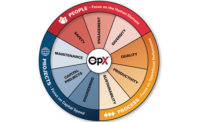OpX Column
The OpX Leadership Network Drives Operational Excellence

The OpX Leadership Network is a community of manufacturing, engineering and operations professionals dedicated to driving operational excellence, which is to understand customer needs, empower the people to deliver those needs, and optimize processes around those needs. Outreach programs sponsored by PMMI, The Association for Packaging and Processing Technologies, identify the issues or needs, and then OpX provides the forum for the best minds to come together and solve common operational challenges and apply best practices and innovative solutions to the real-world context of manufacturing. These solutions are created by industry, for industry and are available for anyone to use.
How it Works
Leveraging the convening strength of PMMI, the OpX Leadership Network provides opportunities for open dialogue between CPG manufacturers and OEMs. The network uses a proven process from ideation to adoption:
- A significant CPG issue is identified through industry events hosted by PMMI. Venues such as PACK EXPO offer numerous opportunities to share ideas and challenges. Critical topics are then conveyed to the OpX Leadership Network for consideration.
- The identified issues are pursued within the OpX Leadership Network Executive Council. Members discuss the issues and gather relevant data. With consensus to move forward, an issue is assigned to a Solutions Group of subject matter experts.
- The Solutions Group is comprised of CPG representatives who define and address the problem, as well as invited OEMs and suppliers who can provide insight on the topic. The group meets periodically online and in person to develop a solution.
- The solution is piloted in a real manufacturing environment. Once the solution is deemed ready, it is released to the packaging and processing supply chain for a thorough peer review prior to publication.
- Once a work product is published, user groups are formed so that insights and experiences can be shared out as guides to implementing OpX Leadership Network solutions.
The Three Focus Sectors
Work products are centered on three sectors: people, processes and projects. These key sectors, along with relevant sub-topics, are shown in the OpX wheel figure.
- People: The People work products deal with safety, engagement and diversity. This sector’s products are:
- Safety: Worker Safety, for the CPG industry, determined through leadership guidance surveys to assess the worker safety programs a company has put into place.
- Engagement: Manufacturing Workforce Engagement, an effort to reverse the trend and cost of disengaged employees.
- Diversity: Women in Leadership, which is planned for development in 2021.
- Process: The Process work products are focused on quality, productivity and sustainability; this sector holds the bulk of the current products:
- Quality: Safe Low Moisture Foods Manufacturing for the validation of the reduction of pathogens in heat processed low-moisture foods. Spotlight on Baking, containing checklists for the validation and verification of baking processes to ensure pathogen-free packaging. Allergen Cleaning Validation Checklist to avoid cross-contamination in food and beverage industries, as well as pharma. Clean-In-Place (CIP) for processes outside of dairy and meat.
- Productivity: OEE Benefits Calculator, a three-part set of tools to answer the questions: What is it? How to calculate it? How to interpret it? Remote Equipment Access, which consists of tools to enable remote access of machine security and parameters.
- Sustainability: Journey to Sustainability Excellence, to accelerate sustainability initiatives and driven by manufacturing awards of CPG plants.
- Projects: The Projects work products answer questions of engineering, capital projects and maintenance, with the following products:
- Engineering: Hygienic Equipment Design for Low-Moisture Food Manufacturing, known as One Voice, an initiative for the CPG industry to determine requirements for design.
- Capital Projects: Total Cost of Ownership (TCO), in addition to operational cost. Request for Proposal (RFP), a template to ensure all questions and problem solving are brought into consideration. Factory Acceptance Testing (FAT), a One Voice document to clarify minimum standards.
- Maintenance: Asset Reliability Roadmap, planned for release this fall, helps define the value of performing and tracking maintenance activities.
Looking for a reprint of this article?
From high-res PDFs to custom plaques, order your copy today!







